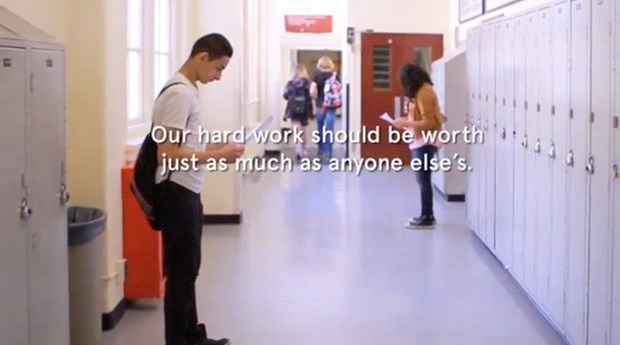When a high school student learns another language, they get a credit towards their graduation — unless that other language is English.
Having English Language Learning (ELL), also known as English as a Second Language (ESL), courses count towards high school graduation is just one of 16 recommendations B.C. immigrant and refugee youth are sending to the Ministry of Education.
The report, Fresh Voices from Long Journeys: Insights of Immigrant and Refugee Youth, was sponsored by the Vancouver Foundation and B.C.’s Representative for Children and Youth (RCY).
“The main thing we noticed was how similar all our experiences were across the province,” said Tanvi Bhatia, 16, who sat on the youth (ages 15-20) advisory team. “It was something that everybody mentioned; it was probably one of their first priorities. We want our work to count in some way.”
With one third of Richmond’s students enrolled in an ELL course, the report will benefit a large portion of the student body.
Released Tuesday morning, many Richmond School District staff hadn’t had a chance to look at it, but one concern was making sure the schools still followed a standardized assessment procedure.
“I don’t have any qualms about it, as long as you’re completing the exams you need to graduate,” said Diane Tijman, curriculum coordinator for ESL and multicultural services at the district.
Tijman said credits are already awarded, depending on the student’s ESL level and the subject. If a student was enrolled in a higher level of ESL science, for example, that could go towards a regular science credit.
The district also gives credits based on extracurricular activity.
“We problem solve to figure out the best plan for the student and award external credits such as horse-back riding or piano, so learning English can be like one of those. But I think the graduation requirements should stay the same, like completing English 12, or Math 10.”
Fresh Voices isn’t looking to replace regular English, but wants their ESL courses to contribute to the final tally needed to graduate.
The report came out of an immigrant and refugee youth summit, organized by Vancouver Foundation and RCY, in 2011, followed by a series of regional meetings in 2012.
“It feels like a no brainer for most people,” said Mark Gifford, director of grants and community initiatives at the foundation. “It doesn’t replace other language credits. If they’re dedicating their time towards this during and after school, why not give them credit for something Canadian students get already?”
It’s also an opportunity for the Ministry to take action and show it’s listening to the province’s youth, according to Gifford.
“They really want to strengthen the communities they live in and it’s great to see them so engaged,” he said. “It’s not a budget issue, it’s a way to assign real value to something, and credits are the real currency for them.”
The advisory team also launched an online petition at www.make-it-count.ca and will present the results to the Ministry in December.
The report contained 15 other recommendations about how organizations can better address the challenges that immigrant and refugee youth face living in B.C., such as, inequalities in the school system and the unique role they play in the family. Approximately 200 youth were consulted.
“School in general can be hard when you’re new, particularly being a person of colour in a school is difficult in a place that’s not your home,” said Bhatia, whose family moved to B.C. from India. “Having something like this count in some way will really help students know their hard work is getting them somewhere.”
To read the full report, visit vancouverfoundation.ca/news.



